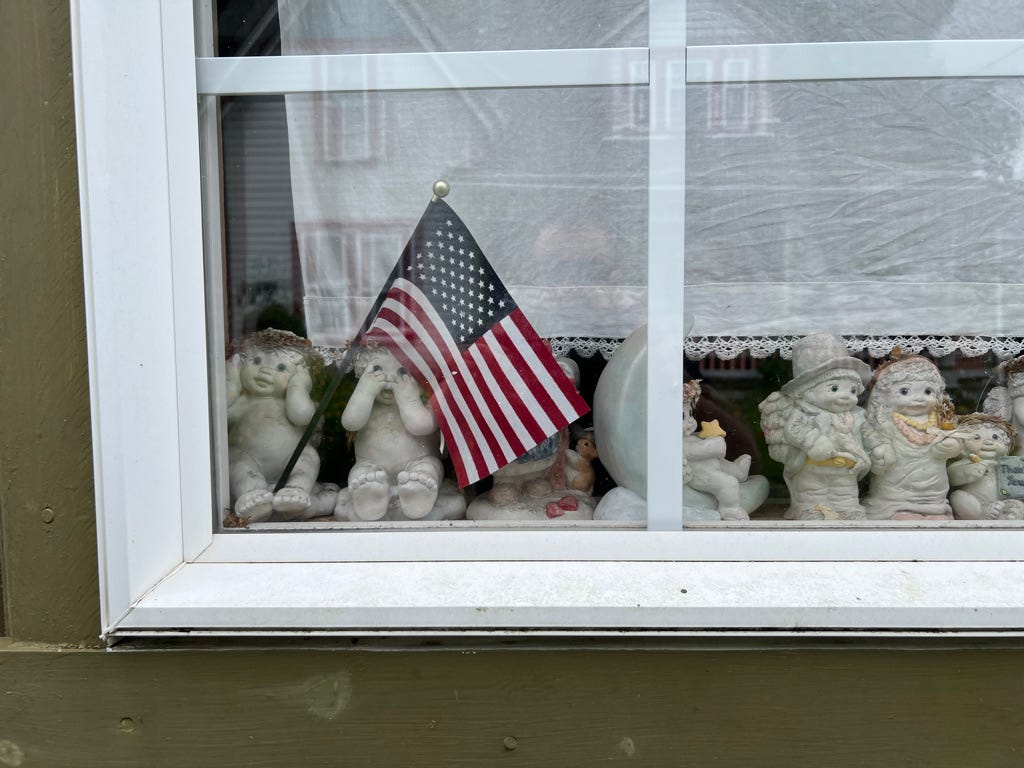When Tom Hanks asked Nora Ephron for writing advice, she exclaimed, “Voice, voice, voice!”
It’s as if Ephron was telling Hanks to talk louder, to project, to speak from his diaphragm. But a writer’s voice isn’t so simple. It’s an enigmatic and elusive thing.
I couldn’t help but thinking that after Tom Hanks went home, he wondered, “Just what did she mean by voice?” It’s like she handed him a jewelry box without the key.
Voice is perhaps the main thing that invites us into a story and keeps us reading. In fact, I’d argue that we’ll read even the most boring story if it has a compelling voice. But the question of how to achieve Ephron’s “voice, voice, voice” is one of the most bedeviling questions for a writer.
When I was a young writer I wondered if I even had a voice. The plain-spoken Midwestern characteristics of my expression lacked dramatic flourishes, erudite curlicues, or those enviably lyrical quirks of Southern storytelling (ah, to be a Southerner—that would solve everything!).
Did I need such things, I wondered? Did I need to go shopping for a different self? Or did I need to find my self in my self?
All writers want to be known for their voice because voice is what makes them distinct. Voice is a work’s personality, its signature—it’s that ineffable something that makes a story so particularly itself (and so particularly yourself).
Yes, yourself, because voice isn’t style, it’s who you are—the song of your literary soul.
It’s not just the linguistic presentation of an individual speaker, but the mysterious atmosphere that makes a work memorable. It’s the room where you listen to a story, the bed you sleep in with an author. Because an author’s voice is a type of kiss, or if not a kiss, it’s something we just want to be with, be in, be around—be compelled by.
Even if the voice isn’t warm or safe sometimes.
As the poet Tony Hoagland says in his book, The Art of Voice: Poetic Principles and Practice, “That presence in voice is not always ‘intimate,’ in a warm, ‘best friend’ kind of way, but the reader must be impressed that the speaker is a complex, interesting individual who is intriguingly committed to what she is saying, and how she is saying it.”
Committed to what you’re saying. Committed to how you’re saying it. These are key building blocks of voice.
Emulating others and developing your unique voice
Voltaire observed that “writing is the painting of the voice; the closer the resemblance, the better it is.”
This definition doesn’t work for me, however. Too many writers try to replicate their spoken voice on the page as if that’s the goal, but the goal isn’t mimetic, it’s performative.
Voice on the page doesn’t necessarily have to do anything with an author’s speaking voice. Louis Menand says:
“What writers hear when they are trying to write is something more like singing than like speaking. Inside your head, you’re yakking away to yourself all the time. Getting that voice down on paper can be a depressing experience. When you write, you’re trying to transpose what you’re thinking into something that is less like an annoying drone and more like a piece of music.”
A writer needs to evoke the rhythm of the story, in other words, the musicality that goes beyond the literality of the text. An author needs to be able to modulate the registers and tones of a voice on the page just like an actor does on stage.
Voice consists of shifting balances and temperatures. It can be by turns confiding, vulgar, or distant. It can be loud or quiet, cloying or independent, insistent or remote—perhaps all within a single paragraph.
We generally talk about voice as a kind of mystical thing that one is born with, almost as if the voice finds the author, but voice isn’t something you necessarily have, it’s something you construct.
Hoagland compares the development of a writer’s voice to the training of muscular movements that a good dancer or good athlete might do. He says that if you broke down any sport into its parts, you would discover that hundreds of precise muscular movements are required to swing a 3-iron, or catch a ground ball, or clear a high jump.
Emulation is one way to train those muscular movements of writing. Emulation helps us find our voice, just as mimicry helps us develop our personalities.
The choices of emulation are similar to the choices of what group of people to hang out with in high school. Do you see yourself as a goth or a jock, a theater geek or a math geek? Do you want to position yourself within Mark Twain’s dry tongue-in-cheek sarcasm or Ernest Hemingway’s terse clarity? Does your story find itself in Toni Morrison’s florid narration or Dorothy Parker’s caustic wit?
We develop our voices through others — as people and as writers.
When I first became a writer, I tried on others’ voices as if I was trying on clothing in a department store. I remember going from minimalists like Amy Hempel and Raymond Carver to maximalists like William Faulkner and Malcolm Lowry to aesthetes like Nathalie Sarraute and James Salter. I spent about a decade trying to write a short story just like Denis Johnson did, and I always think of Lydia Davis when I’m writing super short stories.
I was attracted to these writers because of their singular voices, because I wanted a distinct voice and didn’t think I had one. I think I took a little bit of something from each of them in the end.
I now know that is good for a writer, but when I was imitating them, I always questioned whether I should be developing a more original voice. In fact, I wondered if I had an original voice, or whether I was hampering it by looking to others to develop my voice.
But here’s something to remember: we develop our voices through others — as people and as writers — and originality is nothing more than an odd blend of all of those voices that we decide to put in the mixer of ourselves.
“The truth is, a writer’s voice is made from other writers’ voices,” says Hoagland. “Pieced together, picked and chosen, stumbled into, uninformed: influence seems like an involuntary series of contagions that eventually turns into a sort of vessel, or transportation system.”
Voice as an involuntary series of contagions. We are the people we’ve been infected by. The people we’ve breathed in. The people we’ve caught.
Voice as courage
But voice goes beyond being a mere concoction of different ingredients. There is something mysterious and ineffable about voice, something that seems to live beyond the words on the page. That something isn’t just the writer’s artistry, but something you must seize and assert.
Dani Shapiro defines voice as “courage,” and I think that gets at it. Courage to put your stamp on a sentence, to carry off this textual performance that is the you of you. You’re wearing your favorite scarf with your favorite shirt, and even if they’re mismatched, you don’t care.
Except it’s beyond anything so superficial. It’s more like you’re speaking up in the meeting you’re usually quiet in. You’re saying your truth, your way.
“Finding our voice has to do with finding our safety,” said Julia Cameron. Safety because to find your voice is to find yourself and be comfortable in yourself—to belong to yourself and your story more than you belong to others.
In the end, voice is a question: will you give yourself permission to do this? Just as giving yourself permission to be yourself in life forms bonds of trust, giving yourself permission to assert and perform your voice forms a bond of trust with the reader that incites further listening.
Your voice, in fact, sparks an ongoing conversation, a conversation that doesn’t end with the last words of the story. Your voice transcends the story to have its own separate life, a life that others will seek out because it’s a voice they want to be with.
Today’s prompt: The Confession Exercise
Write as if you're confessing something important to your best friend—something you've never told anyone. The honesty and intimacy required often produces authentic voice.
Please become a paid subscriber to this newsletter …
Because some quotes
“Finding your voice as a writer is really about finding your voice as a person.”
—Cheryl Strayed
“Don't worry about your voice. It will emerge. Meanwhile, allow yourself to be bad.”
—Jennifer Egan
“Your voice is not who you think you are, but who you cannot help being.”
—Stephen King
Join me in Okoboji … to write (and retreat)!
One of the highlights of my year is teaching at the one-of-a-kind
at Lake Okoboji in Iowa this September, which is organized by the very generous and inexhaustible .This will be my third year, and the roster of faculty includes great writers, songwriters, and journalists.
It's such a warm, lively, creative event. Early bird registration is still open!
Because a photo … and Flag Day
Flag Day doubled as Protest Day this year. I hope you waved your flag in patriotic defiance of our current administration’s authoritarian bullying (and general incompetence).
Over the years. I’ve taken various photos of the American flag when I traipsed around places. It was great to see so many American flags this weekend. The flag was sewn with the fabric of protest, after all.








I am not a storyteller at parties. There was no time for listening at my Iowa farm kitchen table when I was a kid. When someone actually turns to face me when I speak, I question every word I say. So I write. Finding my voice is a deep mining through all the lives I've lived. Your insights, Grant, and these book recommendations inspire me to keep digging - thank you!
I’m reading “Clean” by Alia Trabuccco Zerán and this small book beautifully illustrates what you say about voice. It is one long confession and I’m hooked! I dream of writing a book like that one day. But will try your prompt for a short story first. Thank you.